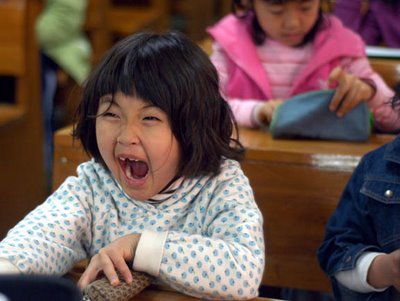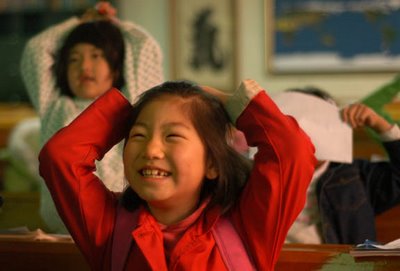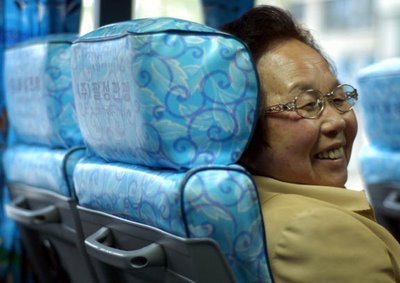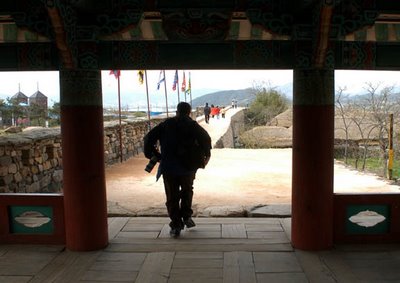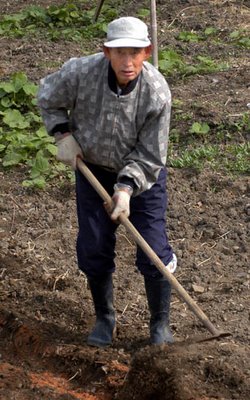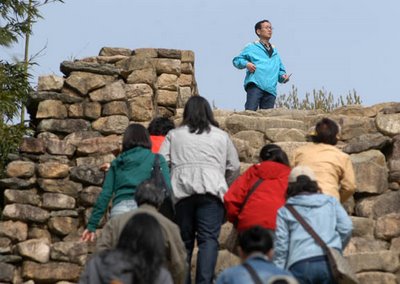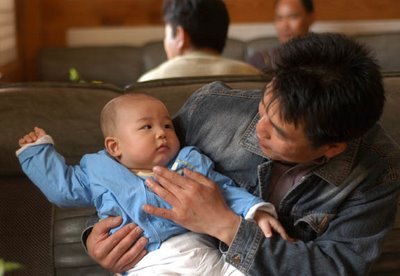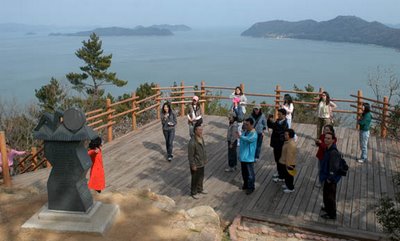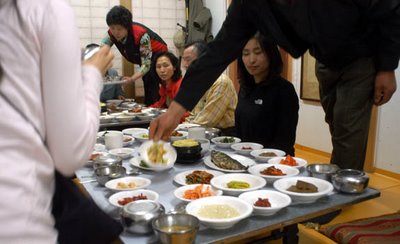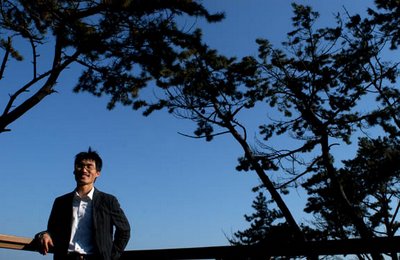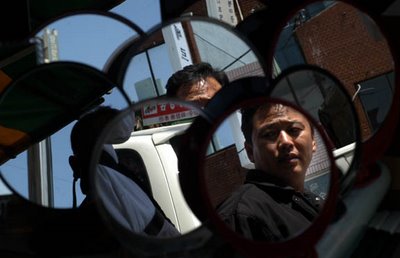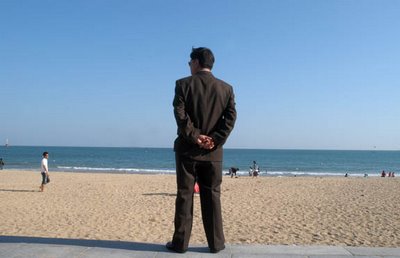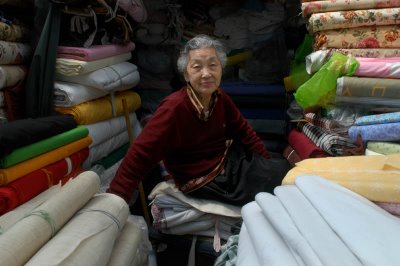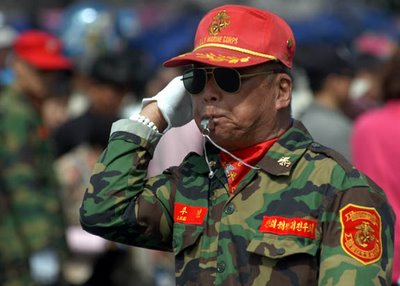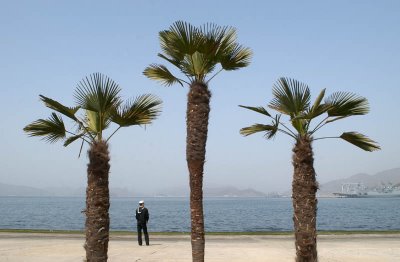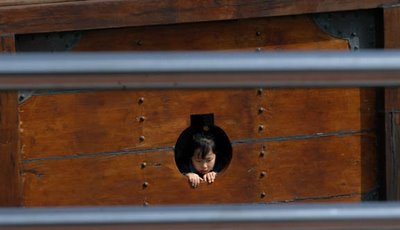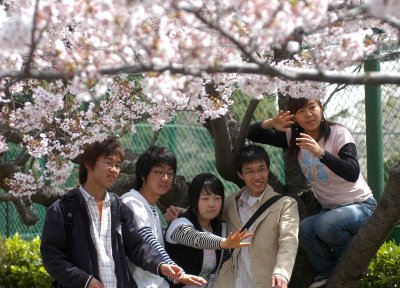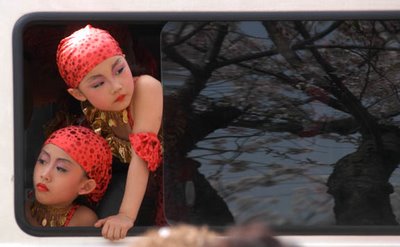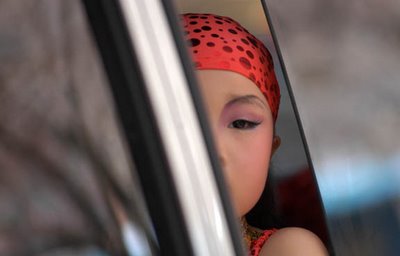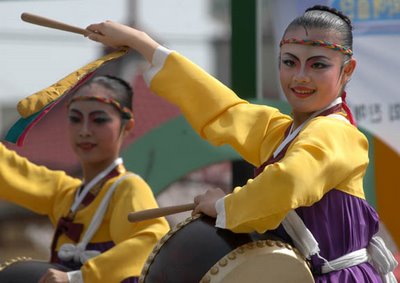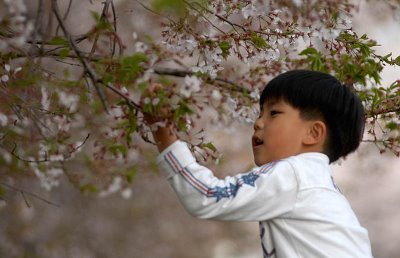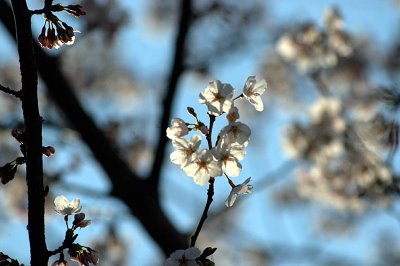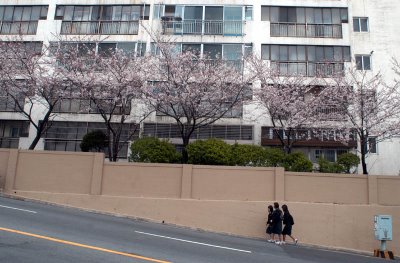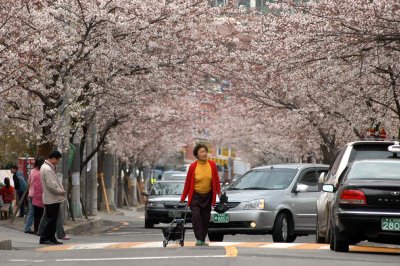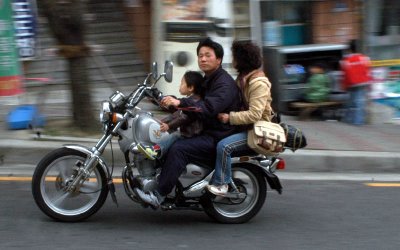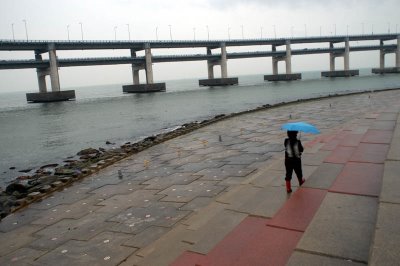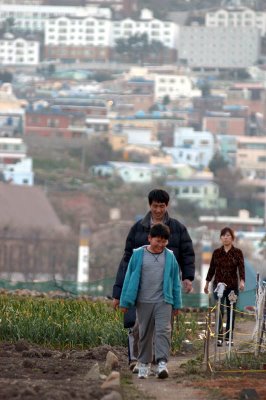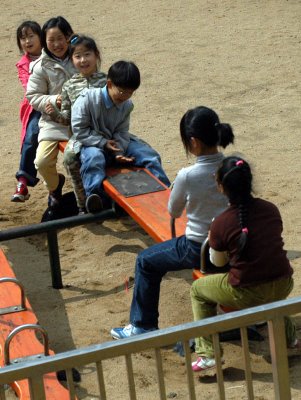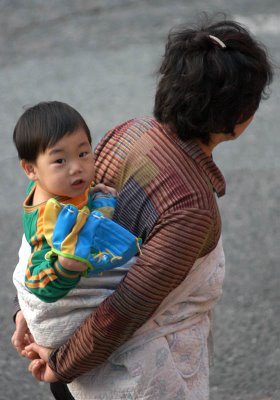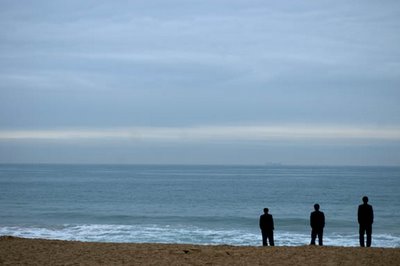
On Sunday I went back to Amnam to hike and get some quiet time. People fished along the dock, turning the concrete red where they were gutting and skinning their catch alive.

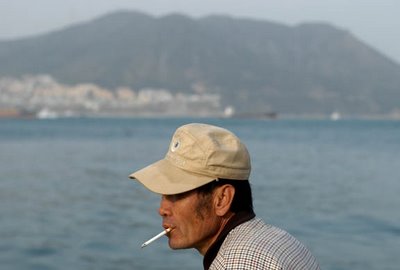

The way was steep back to the parking lot.
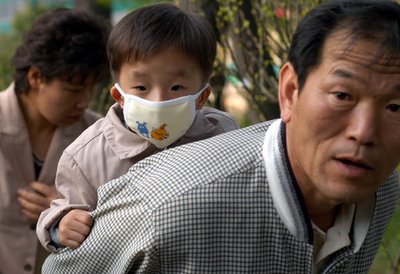
I saw this mother and her baby at the bus stop. That's the building next to my building in the middle-foreground.
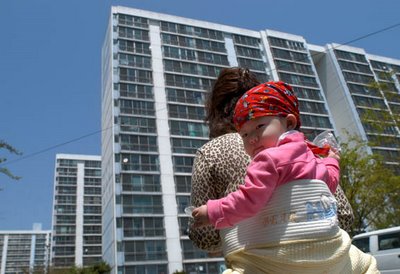
A makeup shop dealing in mostly Western brands.
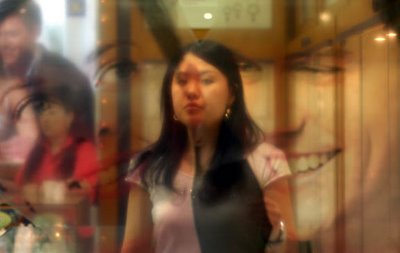
High my short ‘workplace environment’ wishlist is smaller classes. When I first met her, Kristen told me that classes at her hagwon rarely consisted of more than ten children. She said that some of her classes only have a handful of students. Julie, too, told a similar story about YBM, where she worked for the first six months of her now-ended year in Korea.
I only have two classes with less than eight children, and my average class size runs between fifteen and twenty-two pupils. The large size can be a blessing and a curse on both me and the children. On one hand, a large group of kids brings a lot of positive energy into a classroom. Find a game or activity that catches their eye and the childrens’ momentum can stretch it into thirty minutes or more. The competition heats up as children compete, their hands shooting into the air.
‘Mr. Jones! Mr. Jones! Junchisa! Junch--prepo--Preposition! Preposition!’
During these explosions of hands and English phrases, I can’t help but notice the children who are not raising their hands and yelling their heads off. Some look bored, many are flat-out shy and others simply can’t be bothered. I glance at them, sitting quietly in their seat, a maelstrom of English swirling around them, and I worry that they aren’t getting enough ‘air time.’ I lack the sophistication and experience to actually figure out what’s wrong, so I simply confront many of these children during class, which I now think might not be wise.
First, I float an easy question. The smartest children roll their eyes and reach for the sky, but I ignore their plaintive calls and point to the mute child, who’s eyes register something like shock. The class goes silent, as if perplexed by their teacher’s odd definance of the laws of natural selection. The air is heavy with anticipation. The momentum I had built up balances on a knife’s edge.
Usually the victim shakes his head vigorously or crosses his arms in the shape of an ‘x’ in front of his face, pleading with his eyes for me to take my question elsewhere. No, Mr. Jones, don’t call on me, I don’t know, I don’t want to answer, please leave me alone. Sometimes the student will indicate one of the outspoken children and say, ‘pass.’ My shoulders slump and I appeal to the student to give it his best shot. I sometimes guaruntee a point. Still no dice. The child shakes his head, looking around nervously or pointing to someone else.
The pupils on the other team know a dropped ball when they see one. They lunge out of their seat and start yelling, vieing for the unwon point. Screwed out of the point by Mr. Jones’ inconvenient sense of justice, the defending team begins an ear-splitting retort. The smartest children stand and mount a passionate defense for their right to answer the question dropped by their teammate, who is now cowering in shame.
‘TEACHER, NOOOOOO! OUR point! Pass! Pass! He pass it to me!’
I let the cacophony roll over me and I try to mask my frustration. I stare at the student, wondering what could be wrong. Now truth be told, the above anecdote is the compilation of a number of different experiences and not the recollection of a single event. With each child, the story is a little different.
Some of these ‘silent partners’ are, in fact, the brightest or nearly the brightest children in the class, and they can absolutely floor me with their answers. I think of them as English class ‘sleeper cells.’ These children are highly intelligent, good students, and they usually aren’t shy or bored, but rather, they are simply turned off by my style of teaching, which is crafted around a large class size. They aren’t large-group learners.
My sister also had difficulties as a child with learning in large groups, and for a couple of years she attended a private school with smaller class sizes. Besides her normal studies, the school also taught her skills for learning in the large-group scenarios common to most American public schools. After graduating, she enrolled in the Atlanta Public School system and never looked back.
Currently, she is on track to graduate from Georgia Tech in May - one of the premier technology schools in the United States - with a double major in biology and bio-chemistry and a minor in Japanese.
I can’t send these children to an elite private academy in North Fulton county unless I start selling heroin or I rob a bank, but a smaller class size would go a long way towards providing a comfortable learning environment for these children.
Last week many of the children attended day-long or even week-long field trips with their public schools, and thus many of my students were absent. 6A, a massive 22-child class I instruct three times a week, was cut in half. The first thing I did was move the shy, quiet or overwhelmed students into the empty seats closest to the blackboard and confined the miscreants to chairs within the girl’s team, as per some sage advice from Gavin.
Now that they were sitting close to the blackboard, swimming in a much smaller ‘pond,’ a few of the shy students and ‘sleeper cells’ woke up and willingly participated in class. They raised their hands, opened their mouths, and English poured forth. Not all of the students had such a miraculous transformation, but when the field-trips end and 6A regains all of its former strength, I hope to see some of these new hands in the air. I promise I will call on them first.
Sixty minutes is a long time to ask a score of eight-year-old children to sit in hard wooden benches in a darkened room. One would need a massive amount of stimulation, such as a feature-length animated movie, to pull it off. It would be suicidal to teach them about the future tense with stock pictures and chanting. Still, Soo-hyun and I tried just that last Friday.
After fifteen minutes the children began to loose interest. The youngest among them shifted nervously. Other started kicking backpacks or doodling on their handouts. Another ten minutes and the fidgeting had reached a crecendo. The classroom buzzed and hummed like a hot powerline searching for a ground.
A few minutes later that energy started to leak. The children started searching for more stimulation. They chatted or played rock-scissors-paper or played hide-and-go-seek with their neighbors under their desks. Others turned off like unattended computers, leaning on their neighbors like drunkards, eyes closed, a peaceful, future-tense induced slumber written on their faces.
The last few weeks Soo-hyun had some truly inspired lessons planned. We had great success with singing and dancing numbers such as ‘The Hooky-Pokey’ and ‘I’m A Little Teapot’ and teaching about insects. Jumping from creepy spiders to ‘My mom will make sandwiches and pack a thermos,’ was not a leap the students apparently cared to make.
Entire blocks of children were in la-la land, completely disengaged from the material. Even high-octane Jeong-yoon appeared bored, her head on her desk, staring up at the screen with a look of resignation painted on her face. Only a few students clung to the lesson. By minute forty the class was well on its way to getting out of hand.
The first to crack was Jeong-han, the boy whose parents recently divorced. Jeong-han is something of a mess. His mood swings rapidly from joy and compliance to anger and defiance, which is usually dominant. He obviously doesn’t give a lick for English class, and spends the majority of his time yelling his head off, running up and down the aisles, or generally doing whatever it takes to be the center of attention.
As the situation worsened in the auditorium Friday, the mounting chaotic energy fed Jeong-hans own inner mayhem and he did little to control it. He repeatedly left his chair to go talk to other students or hide behind the red stage curtain, which would draw Soo-hyun or myself away from what we were doing in order to Jeong-han back into his seat. After twenty minutes of class I had positioned myself directly in front of Jeong-han, who responded to this police action by staging a private riot, hitting me, pulling on my clothes or attempting to climb over the desk.
At one point I was distracted trying to teach two students from 1-2B and Jeong-han made a break for it. He managed to get on stage, where he plopped down in a green chair, center stage, the blinding LCD projector revealing him for all to see. Here I am. Look at me. His classmates found this the height of comedy, and they pointed at Jeong-han and laughed. Jeong-han wore a wide, nefarious grin. Soo-hyun quickly removed him.
A few more outbursts landed poor Jeong-han finally in the seat directly in front of Soo-hyun, though his proximity to the authority figure did little to curb his bad behavior. The fidgeting resumed, his arm his the laptop computer hooked to the LCD projector and it began to fall. Soo-hyun lunged in time to catch the two-thousand dollar machine, but the mouse clattered to the floor. Everything stopped.
The accident got everyone's attention. Soo-hyun's face was screwed up into a look of anger and frustration built mainly from fifty minutes of teaching an unwilling and apethetic class about the future tense, and this was the last straw. The sudden silence dwarfed Jeong-han like a sheer cliff face might dwarf a climber, but it did not cowe him. Jeong-han's grin lost little of its wattage even as Soo-hyun read him the riot act.
There, Jeong-han, there is the attention you desire, I thought to myself. Probably not the attention you need, but you don't really care, do you? You are hurt and probably overwhelmed with feelings of humiliation, anger, and betrayal. Your parents, the bedrock of your existance, has betrayed you. Your world has been yanked out from beneath you and you're pissed.
On Jeong-han's face was a look of mock shame as Soo-hyun finished reprimanding him. The smile and the fidgetig returned the second she diverted her attention. Jeong-han apparently felt no shame or guilt for disturbing the class and nearly destroying an expensive machine. His anger with the world murdered those feelings and his insatiable need for attention quickly buried them. Inwardly, I felt a great deal of sympathy for the boy who, ten minutes earlier, had been trying to stab me with a pencil. I probably won't be seeing much more of him.
And now for the "Korean Files," which has been combined with the "What were they thinking?" section.
"My class went see a musical and it was Jiggle and Hide." Notebook entry.
"I learn 15 different subjects, Korean, Math, English, Music, Computer, Morals, Jugglery and Tyrannical Government."
"Fairlysm Wonderful for the people."
"Fairly Korea" Both from a sticker stuck to a vendng machine.
Well, that wraps up SoKoNotes for April 23rd, 2006. I hope you all enjoyed it. The cherry blossoms have fallen and the road to Nampo-dong is trimmed in pleasing green foliage. The temperature is perfect for getting outside. I'll see you all again next week. Goodnight. --Notes
